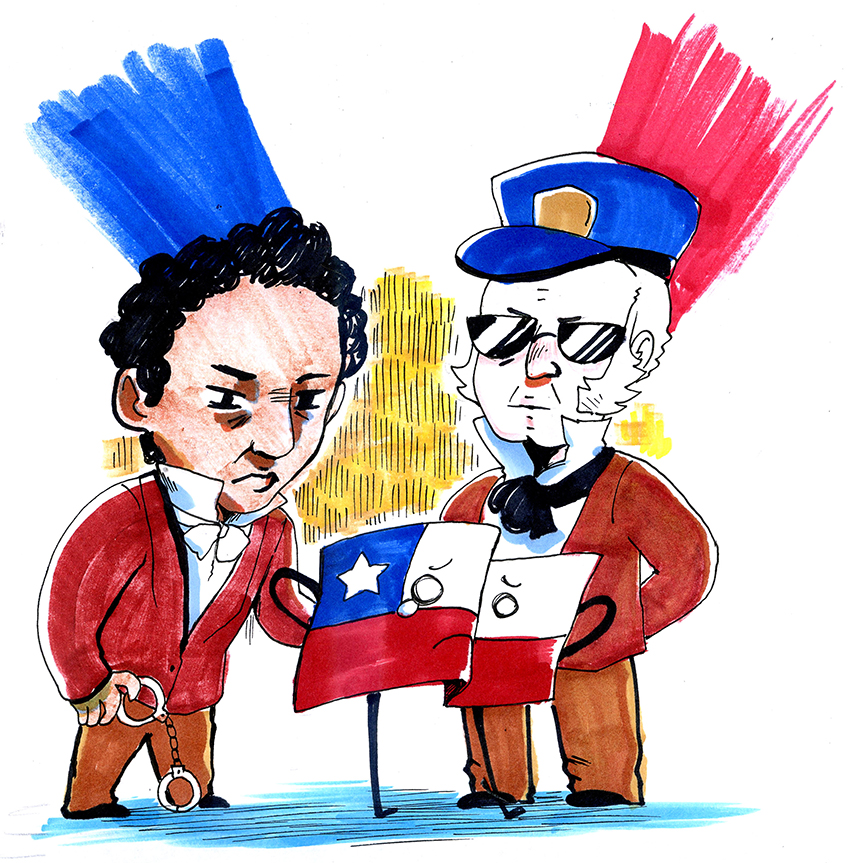Led by Tom Oliverson, the Texas Legislature recently passed a resolution chastising Texans for using “the Republic of Chile flag emoji in digital forums when referring to the Lone Star Flag of the great State of Texas.”
That Texans confuse these two flags in the first place is surprising; Texas steeps its residents in a blend of history and pride more potent than the patriotism of most countries. However, many Texan-bred students have questioned if the education system’s emphasis on Texas history — and the correlative state-pride that prompts such an inconsequential resolution — enriches students’ educations.
Texas requires two years of Texas history: 4th and 7th grade. From what little I remember of my own 7th grade social studies class, we spent the majority of class time watching movies, including two artistically embellished versions of “The Alamo.”
I might be able to justify the two year-long cinematic detours if my own demographic didn’t lack basic knowledge of U.S. history, geography and civics. In a study by the National Assessment of Educational Progress, between 73 to 82 percent of students did not achieve a “proficient” score on an exam testing U.S. history, geography and civics. Since we have no reason to believe that Texas completely defies this trend, Texas cannot devote two full years of social science to state history.
To be fair, the only fact I retained from 6th grade world history is that the assassination of Archduke Franz Ferdinand caused World War I, which is a gross over-simplification. Elementary and middle school history classes, by necessity, must greatly simplify what they teach. So maybe there’s merit to scaling down the topic we study to a more manageable size — our modest state instead of the entire U.S.
Though not the most impactful use of students’ or educators’ time, Texas history is probably here to stay — at least as long as we have Oliverson’s fastidious state-patriotism in the legislature. If we want to maximize the value to students, we need to make a few changes to the curriculum.
Executive Vice President of the Texas Public Policy Foundation, Kevin Roberts, who taught Texas history for many years, warned that when teaching history in general, it is “easy to shy away from difficult topics (such as) slavery and segregation.”
The TEKS (Texas Essential Knowledge and Skills, the required topics for all Texas public schools) for 4th grade Texas history do not mention either of these topics. The 7th grade TEKS mention slavery, but only as it pertains to the outbreak of the Civil War and tensions during the Reformation. Roberts believes firmly in the value of teaching Texas history, but also acknowledges that the curriculum must explore complex topics more deeply.
The word “minority” as well as the names of actual minority groups, do not appear at all in the 4th or 7th grade TEKS, either. Its cursory reference to the assimilation of various “racial, ethnic, and religious groups” does not do enough to prepare students to understand modern complexities surrounding race and religion.
Adjusting the curriculum’s paradigm to avoid framing Texas as a homogeneous population would allow students to apply their knowledge of Texas history to contemporary state and national events. Texas history courses should prime students for a better understanding of events outside of Texas.
Marabella is a business honors, Plan II and Spanish freshman from Austin.





















